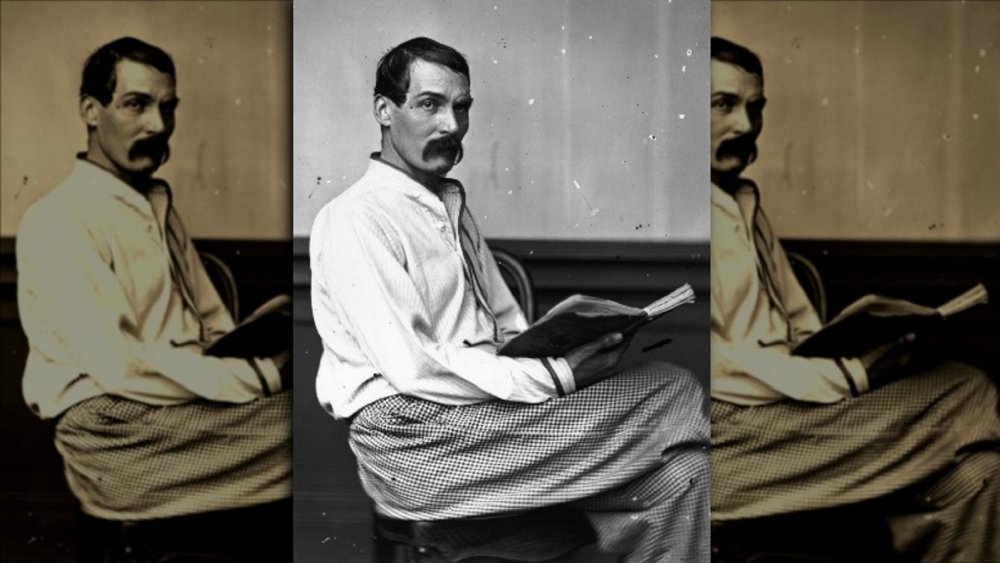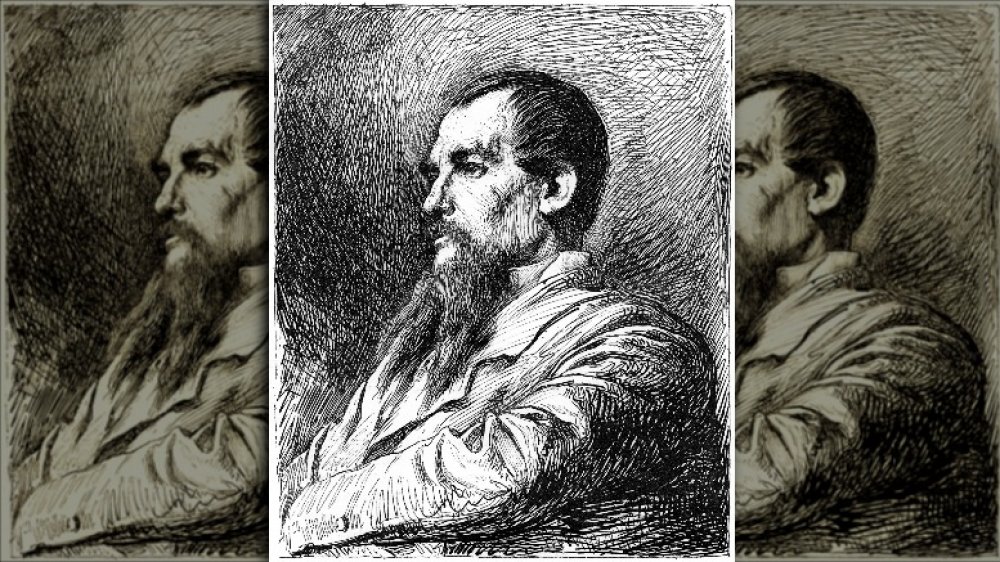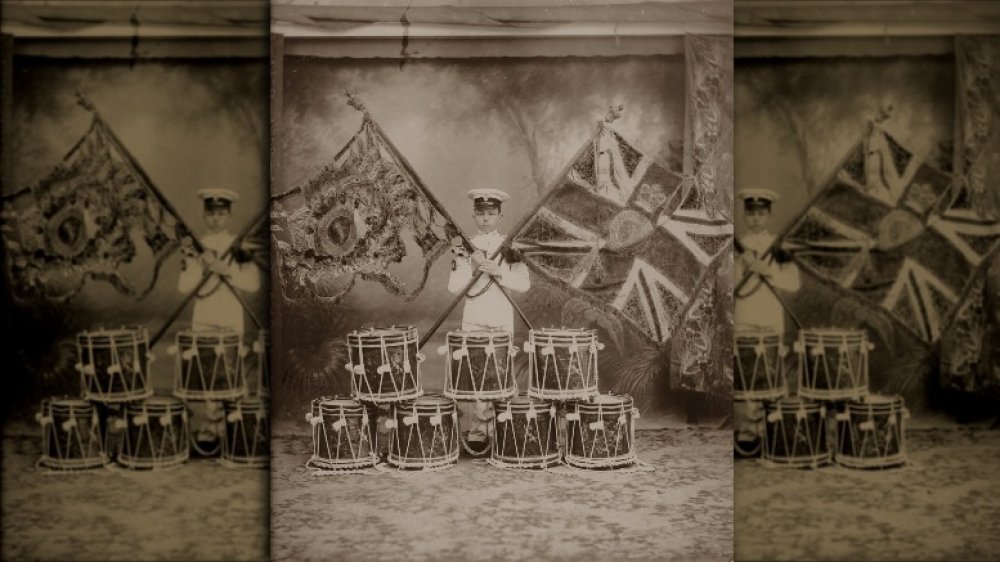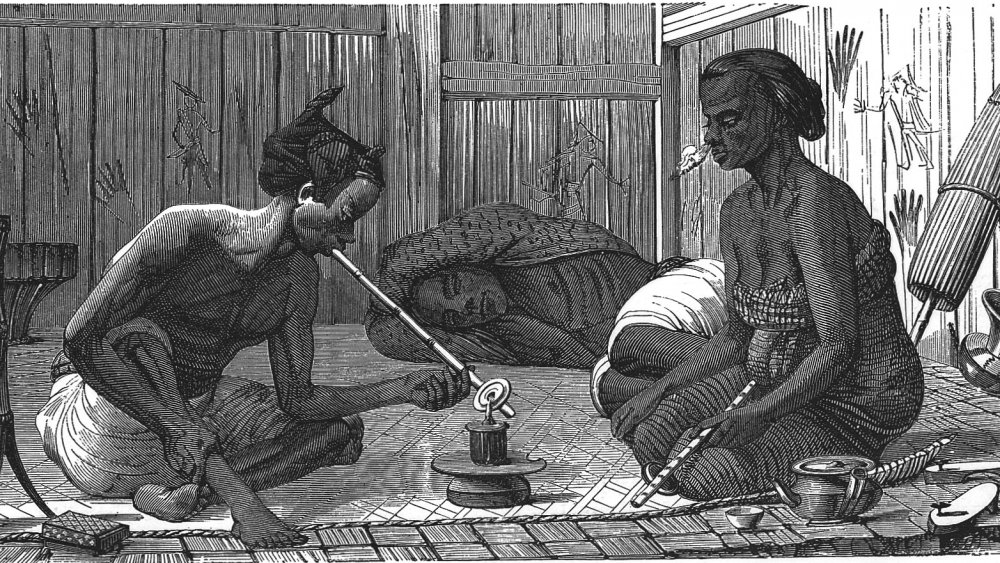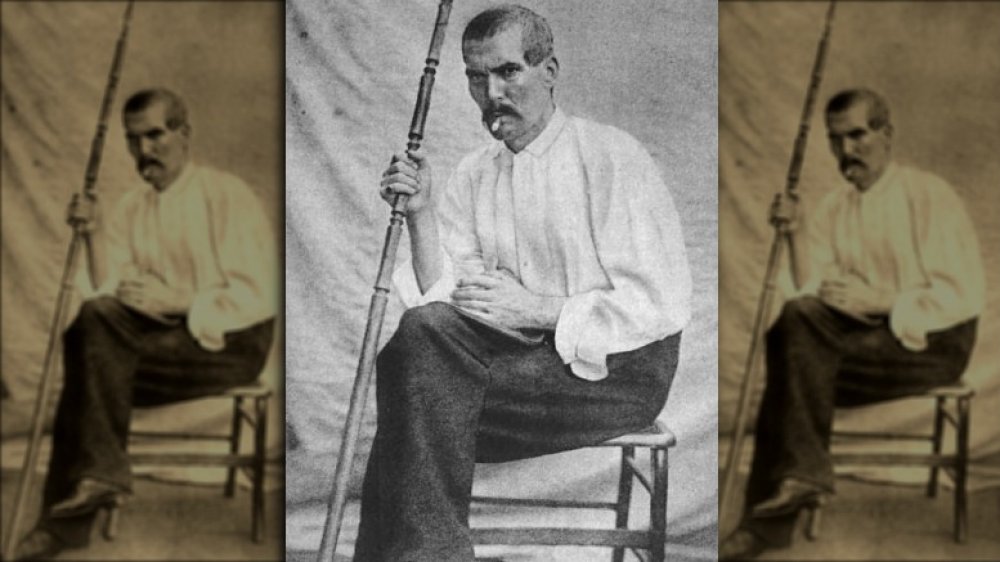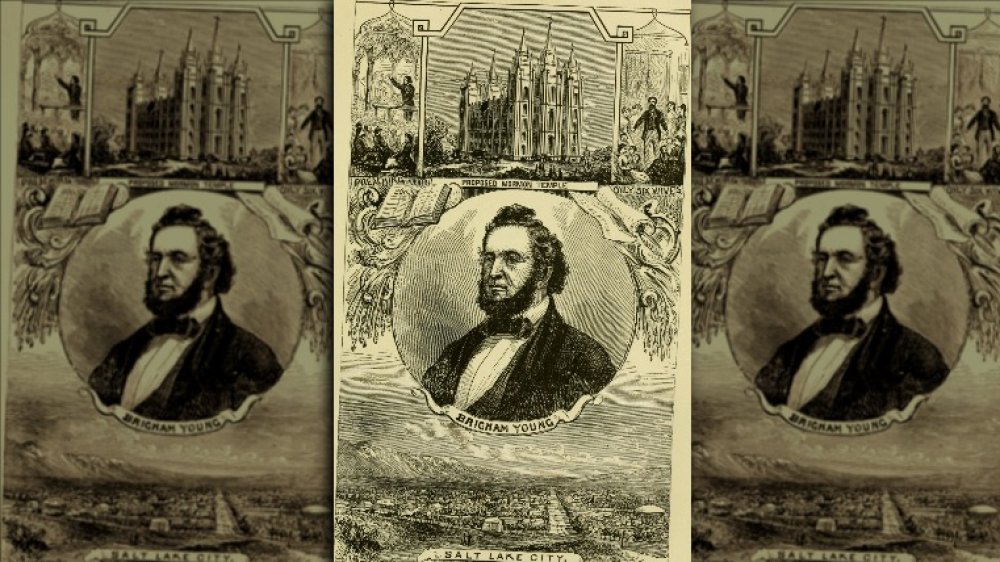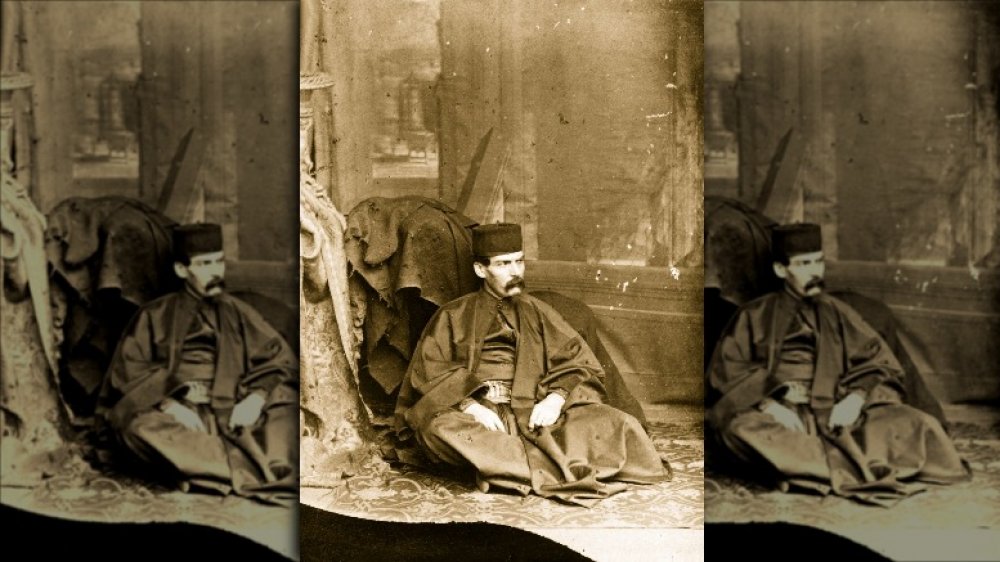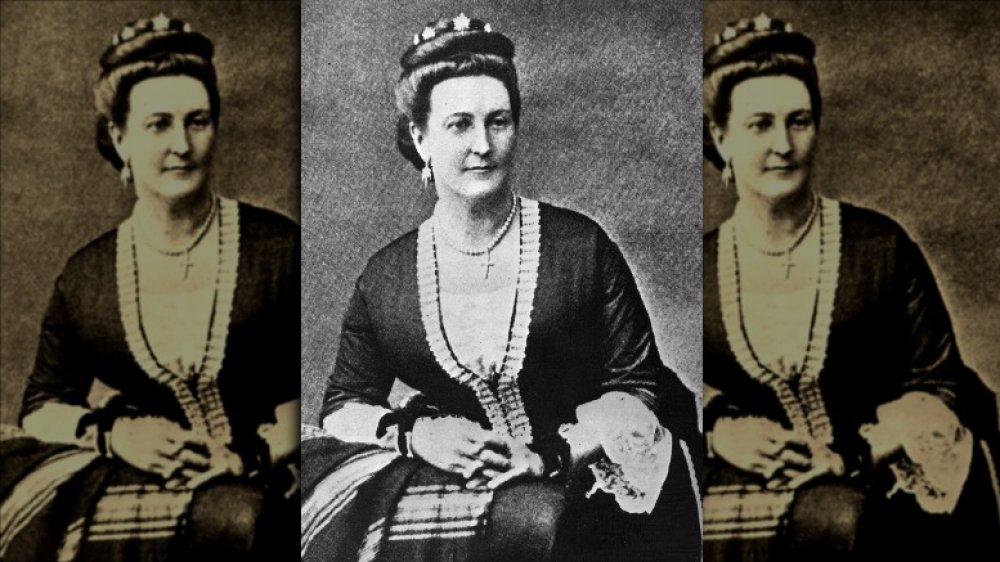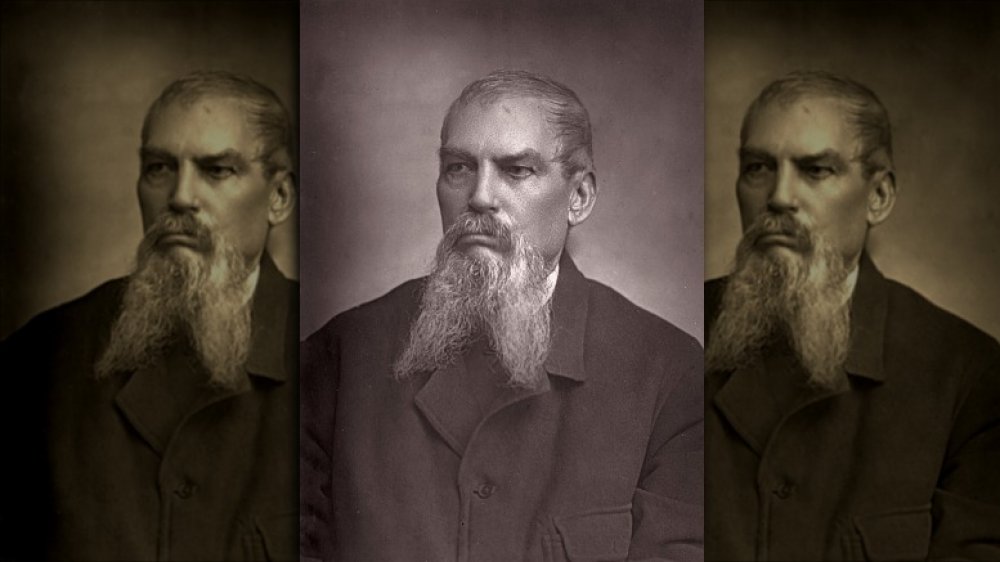The Crazy Adventures Of Sir Richard Burton Explained
The Victorian age was rich with fascinating characters. Even seemingly staid figures like Charles Darwin had backstories that seemed straight out of a Hollywood script. Maybe that's because it was easier to reinvent yourself in the era before digital footprints and government ID. Maybe it's just because everything seemed fresh and new in a time when, frankly, stuff was fresh and new. Regardless, the Victorian era produced some wild adventures — including one of the wildest adventurers of all time, a scholar and explorer who made Indiana Jones look like an uncultured, ignorant chump.
He spent years experimenting with mystic religions, doing drugs and drinking, investigating local customs (preferably of the lewd variety), and cramming his brain full of knowledge while managing to spark a deadly feud, infuriate an entire religion, survive several life-threatening diseases and injuries and a couple wars, and write about a billion pages recounting it all.
Let's meet Sir Richard Burton, better known as "Ruffian Dick," shall we?
Who was Sir Richard Burton?
Nope, we're not talking about the guy who married Elizabeth Taylor twice. Our hero is Sir Richard Burton: the Victorian adventurer and explorer who out-swashbuckled just about everyone else.
Rising from relatively boring circumstances to become a knight of the Empire and world-renowned scholar, explorer, and diplomat, Burton was the very picture of a Victorian gentleman ... on the surface. Dig down a little bit, though, and the guy was anything but prim and proper. Burton's idea of a good time was a night smoking opium, checking out the local ladies, and maybe stopping to learn a new language or go on an archaeological dig on the way home from the pub.
According to Britannica, by the time of his death, he spoke 25 languages — 40 if you count dialects. As the museum in his honor remarks, he made a name for himself as a geographer, archaeologist, ethnologist, and author and found time along the way to become a connoisseur of fine dirty books before passing away at the age of 69. Most importantly, Burton was anything but conventional, as his lifetime of getting fired for doing his own thing and defiance of Victorian morals proves.
Sir Richard Burton got expelled from college on purpose
Born in Devonshire, England, in 1821, Burton was raised in France and Italy by an ex-army dad who loved to travel, as the BBC notes. From a young age, he proved awesome at languages and terrible at behaving himself — when he wasn't picking up various dialects, he spent most of his time learning to box and fence.
His father decided that his sons should go into religious service and sent Richard off to Oxford. He hated it, declaring that he was smarter than most of his professors. Even worse, as far as Burton was concerned, in Italy, he had been surrounded by "such tremendous dandies and ladies' men" that the "boorishness and shoppiness" of prim Victorian schoolboys was intolerable. He spent as much time as he could drinking and fencing, as a 1906 biography notes.
Eventually, he got so sick of the whole thing that he arranged to get expelled. Burton ditched class, went to a horse race, and then purposefully offended the disciplinary board by lecturing them about treating the students like children by forbidding them to go to the races in the first place. While the other students who skipped class with him were just suspended briefly, according to the Richmond local history society, Burton was expelled.
Mission accomplished: Burton was in no danger of having to become a clergyman, trapped in what he considered a suicidally dull existence. He was free to run amok.
Sir Richard Burton bribed his way Into the army
Now that he'd been expelled from college and didn't have a clear career path, Burton was free to do ... what, exactly? He longed for a life of adventure, and the easiest way to get that was join the army like his dad. Buying officer commissions to skip out on grunt work wasn't too unusual in Victorian times. With nothing else to do, Burton bribed his way into the army and landed a sweet post with the British East India Company. As the Encyclopedia Britannica blog relates, he shipped off to India, where he learned a bunch more languages for the fun of it.
But it was culture that came to fascinate him — everything in India seemed so much cooler than the boring English morals he'd left behind. Burton became fascinated by Sufi mysticism and managed to get a local mentor to train him, becoming a Sufi master, as The Life of Sir Richard Burton by Thomas Wright relates.
Of course, he still technically had a day job to do, namely creating ethnographic reports to help the British manage their Indian colonies. Even there, he put his own stamp on things, recording local dialects and sexual practices instead of, you know, economics and trade. The International League of Antiquarian Booksellers notes that he once again shot himself in the foot career-wise. When he produced a particularly spicy report about homosexual brothels in Karachi, his superiors put a black mark on his record, ending his hopes of ever getting promoted.
Sir Richard Burton snuck into Mecca in brownface
With army promotion a non-starter, Burton went back to England for a bit. Just 29, he was bored but used the time to write a couple of books on Indian culture. Then, tired of sitting around, he decided to do something forbidden to dudes like him: He would go on the Hajj, the annual holy Muslim pilgrimage to Mecca.
This wasn't just a stunt by a bored, privileged white 30-something. Burton's journals make clear that he truly respected the Sufi branch of Islam, and he legitimately wanted to see Mecca and Medina. But man, did it turn out to be a stunt. Using some serious Mission: Impossible disguises and a whole lot of arrogance, Burton snuck onto the Hajj and into Mecca, which was forbidden to non-Muslims and especially white Victorian English guys, as Mental Floss relates. If he'd been revealed as an Englishman, rather than the devout Indian-Afghani he was pretending to be, he'd have been killed on the spot, as a journal entry published on Eyewitness to History asserts. And then he wrote a bestselling book about it, as one does.
Burton's taste for action was only getting started. As Britannica notes, instead of heading back to England to enjoy his fame, Burton bummed around the Middle East for a little while longer, collecting material for another book or two and formulating the plan for his next big adventure: solving the mystery of the Nile River.
Sir Richard Burton and the quest for the Nile's source
When you're a swashbuckling iconoclast in search of an adrenaline hit, it's not enough to break a bunch of laws and violate the sanctity of a holy event. Nope, next up for Sir Richard Burton: insulting a whole continent! This time, Burton was headed for Africa, the "Dark Continent," to once again prove the supposed superiority of white English dudes.
In the 1850s, the Western world was obsessed with exploration, and for the English, the great adventure was to be found in Africa. As The Great Courses Daily notes, the biggest prize of the time was considered to be figuring out the source of the mighty Nile River. Burton was all over it. In 1855, he teamed up with John Hanning Speke and a couple of other explorers to head to what's now Somalia to start their quest.
It, ah, didn't go so well. Within days, they'd been attacked by furious locals and, as Adventure Journal recounts, Burton took a spear to the jaw. Owie. That put a hold on his African adventures for a bit, but he was soon back. According to the BBC, he joined an expedition funded by the Royal Geographic Society in 1857, heading back to Africa with Speke.
Sir Richard Burton drank and drugged his way to Lake Tanganyika
There's nothing like exploring a vast wilderness full of deadly hazards like malaria-infested mosquitoes and ravenous crocodiles to get the blood flowing. Unless it's drinking and womanizing as much as you can along the way, with a few stops to try out the local drugs and document various stimulants for the record. It's amazing Burton was sober enough to notice the gigantic lake in front of him in 1858.
Adventure Journal notes that he had plenty of time to get up to no good: Burton and Speke wandered around East Africa for nearly two years before making their first big discovery. And by big, we mean really big – Burton and Speke were the first Westerners to lay eyes on Lake Tanganyika, the longest freshwater lake in the world. As the BBC relates, things hadn't been going smoothly: Ravaged by malaria, Burton could barely walk by then, and Speke was mostly blind.
It didn't help that the two had come to annoy the bejeezus out of each other. Speke was an upstanding Victorian gentleman who wanted to make discoveries for Queen and Country while shooting any big game that wandered by. Burton, in contrast, was still up to his old trick of being as licentious as possible, usually under the guise of "scientific research." As the Financial Times relates, one of his hobbies was seeing how various Africans' private parts measured up, length-wise.
Yes, he kept spreadsheets.
Sir Richard Burton picked a fight over bragging rights
Although Burton and Speke went on to explore Lake Tanganyika's shores together as much as their failing health would allow, they still hadn't proven that this vast body of water was the source of the Nile.
When they got word of another, even bigger lake further inland, the temptation was too much for Speke to resist. He was feeling a little better than Burton, who was knocking on death's door. While Burton was recovering at an Arab slaving camp (and possibly getting up to no good with their hosts on his better days), Speke headed off to see what there was to see, as the Financial Times relates. Lo and behold, Speke stumbled on Lake Victoria, which was indeed bigger than Tanganyika. Back at camp, Burton refused to believe him, and the men started getting madder and madder, arguing back and forth about who had made the better discovery.
In the end, they split up, and Speke made it back to England 12 days before Burton, promptly proclaiming that he'd found the source of the Nile, despite lacking any definitive proof. As History Today notes, the two men were instantly at each other's throats. Fame and reputation were everything to Burton, and he couldn't stand that Speke, his traveling companion, had outdone him. Thus started years of name-calling, both in print and in public debates.
Sir Richard Burton wrote a 700-Page book about his American vacation
Burton published The Lake Regions of Central Africa in 1860, in which he set up poor ol' Speke as a prudish, incompetent coward and himself as a dashing, manly adventurer — and claimed that he was the real discoverer of the source of the Nile. Then he promptly buggered off to the USA for a long vacation.
Over 100 days, he traveled down the East Coast, through New Orleans, and out West, spending most of his time around Salt Lake City, according to the International League of Antiquarian Booksellers. He was fascinated by the Mormons' practice of polygamy, which was still common at the time, and took extensive notes. Yep, our Ruffian Dick still loved his steamy anthropology.
Back in England, Burton wasted no time in writing a massive 700-page book in which he proclaimed himself an expert on all things American and especially Mormon. He also wrote a tourist's guide. While writing, he found time to marry Isabel Arundell, a good Catholic girl he'd been secretly seeing for nine years, according to Burtoniana.org.
With a new wife, Burton decided to start a new life and joined the British Foreign Office as a diplomat, getting a consul posting on a Spanish-controlled island off the coast of West Africa, per Britannica. Unfortunately, the wife thing didn't work out so well — the island was rife with malaria, and Isabel declined to join him.
Sir Richard Burton got fired after a bunch of scandals
Burton finally returned to England three years later and promptly got into another massive fight with John Speke, newly returned from a second trip to Africa in which he explored further around Lake Victoria to prove his claim that he'd found the source of the Nile.
In 1864, the two men were supposed to have a debate to settle the issue once and for all when Speke died under mysterious circumstances, getting shot in the chest in a "hunting accident" the morning of the big event. As History Today notes, to this day, no one's sure if it was a legitimate accident, suicide, or something darker. To his credit, Burton didn't immediately jump on the opportunity to claim he was the discoverer of the source of the Nile — good thing, because it would later be proven that Speke had been right and Burton wrong.
Instead, Burton bounced around different diplomatic posts, including a few in the Middle East that his aristocratic wife arranged for him, usually getting himself sent away after producing extremely detailed reports about, shall we say, "interesting" local pastimes, as Britannica notes. In 1871, he finally got himself fired — ostensibly for trying to incite the locals in Damascus to rebel against the Ottoman Empire but likely actually for being an attention-seeking jerk who spent more time drinking and sleeping around than doing his job.
Sir Richard Burton settled down to translate explicit books
No longer a Foreign Office diplomat, Burton was nonetheless still gleaming with the sheen of fame for all his international hijinks over the years — and helped by his massive catalog of best-selling books to keep him in the spotlight. So despite being pushed out of actual diplomatic service, he got the "consolation prize" of a really nice government post in Trieste, which was then part of the Austro-Hungarian empire and is now part of Italy.
Being a Victorian consul was a pretty cushy job, which left Burton plenty of time to write a huge variety of books on history (including A History of Farting) and archaeology ... and to translate Arabian Nights and the Kama Sutra with all the sex intact.
This was a huge deal in Victorian England, which liked to pretend that sex was a thing that just didn't happen. Burton's translation work was something of an open secret — he was already well-known as an open-minded kind of guy and had a reputation for being a little kinky, what with all those reports over the years on local sexual practices. (Most of them were far too detailed to be the work of a distant observer.) But it did have to be secret — if he was any more open about his work, he could have been prosecuted and imprisoned for his "loose morals," as Britannica relates.
Sir Richard Burton's wife tried to sanitize his history
Despite being a proud flyer of the freak flag when it came to anything involving sex and drugs (he probably would have loved rock and roll), Richard Francis Burton managed to get himself knighted in 1886, as the BBC notes. Burton spent his last few years in Triste happily writing away, with his final work yet another translation about good ol' sexy times. As he put it, according to the Financial Times, "I translate a doubtful book in my old age, and I immediately make 16,000 guineas. Now that I know the tastes of England, we need never be without money."
Meanwhile, Isabel Burton, now Lady Burton, pretty darn well-off and a remarkably patient woman, had always been intelligent and headstrong — you had to be to deal with Richard. History Today notes that she was basically Richard's business manager, getting him good postings and making sure he made a profit on all those books he was churning out. But after he died in 1890, Isabel set about doing posthumously the one thing she couldn't do in life: changing her husband.
When he died, according to Burtoniana.org, Isabel did her best to make Richard look like a good, upstanding member of British society. She burned his papers, redacted every diary she could find, and wrote a biography depicting him as a good, meek, god-fearing Catholic. Heck of a retcon.
Sir Richard Burton's legacy today
Lady Burton's ploy more or less worked — Sir Richard Burton remained super-famous throughout the Victorian age, though he was disqualified from being buried at Westminster Abbey due to his "indiscretions," as ILAB puts it, and was instead buried under a marble Bedouin tent in London's Mortlake.
Although Burton shared some of the Victorian era's more problematic tendencies, especially when it came to thinking only rich white European men were actually human, he was more open-minded than many of his peers. As the Financial Times notes and as his own writings bear out, Burton may have thought of Africans as largely "barbaric," but he thought very highly of the practices of various native societies in India and the Middle East. He genuinely seemed to love embedding himself in new cultures and learning about them with an open mind, which is more than can be said for too many people even today.
That might be part of why Burton is renowned today as a remarkable scholar, linguist, translator, and, yes, adventurer. He's got his very own museum and a conference dedicated to him, among other things. The 2021 edition will mark the 200th anniversary of his birth.
We hope there's an open bar — Sir Richard would have appreciated it.
